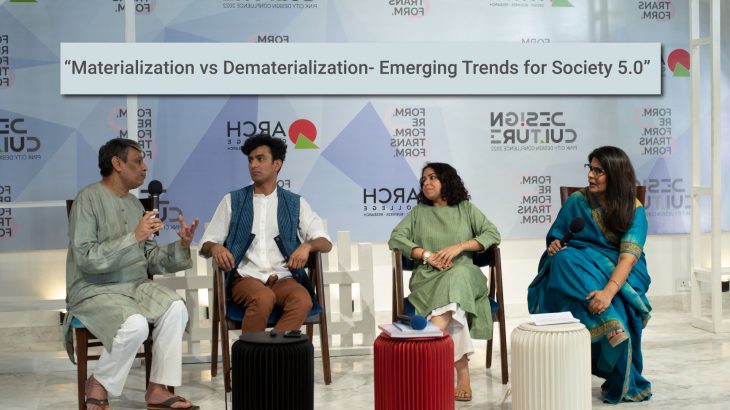The designing community holds a huge responsibility to create something worthwhile and valuable for people across the globe. As said, “with great power comes great responsibility,” the actual designers must choose to cater to the audience in various societal situations to provide the best possible solutions. Every decision made by a designer has a cumulative effect on each part of this Design Ecosystem which beholds the people’s trust and reliability. However, designers need to be more practical in their design approach or what it represents. They must step up to expand the Design Culture towards harmonious livability between a creative and imaginative space for a better future in this ever-changing, uncertain, complex, and mysterious world. Therefore, this session discusses the indigenous and modern design knowledge in society according to various societal problems.
The speakers and their thoughts on the topic:
Mukesh Sharma, a textile designer shares how confidence is essential no matter whatever technique or strategies one opts for to take business to the next level. It would be best to have confidence in the design and its story. He says Learners should represent their design because they want to achieve something for society. Instead of looking up to past design successes and following them, the core theme should be determined by the change Designers wish to bring to the community with their products.
Rameshwari Kaul is the Co-founder of the Design & Development of Cotton Rack. Cotton Rack is India’s leading e-commerce company that provides Eco-Friendly products. Kaul speaks about finding the balance between a designer’s voice and thoughts. She focused on why it is good to produce the product for the masses. Rameshwari underlined many thoughts: why should Design Thinkers go for this traditional technique to minimise usage and wastage and provide longer shelf life and sustainable produce for all future global arenas. She talks about Handloom being a unique sector in the Indian design culture market, with each piece enhancing our traditions and bringing great connection with the customers.
Anupam Arya is the Co-founder of Fabriclore. He is on a mission to create a new age fabric cum bespoke couture chain brand specialised in Indian crafts contemporary fusion combining the best of textile traditions and modern tech. He speaks about how and why local artisans should be allowed to learn modern technologies to make their work more accessible and refined. The technology is well utilised when it reaches the right audience for creating a significant difference. He believes that evolution with time is vital to make designs pretty & simpler and develop a robust indigenous community that can build unique creations. He also speaks about how he is inclined to train local or regional artisans present in our locality who will create products that are unique, new and trending “for you and just for you” with full customisation. It will improve the strength of our local community and will encourage more people to join this community and offer the most satisfactory and unique experience.
Moderator of the session: Archana Surana- Founder and Director of ARCH College of Design & Business contributes to the youth space and women’s empowerment with her positive support. She is also Founder & Chairperson –@womenmentorsforum, Vital Voices LEAD Fellow, US State Department Alumnus & Former Dean-RISU (Design). As the moderator, she first introduced the audience to the concepts behind Society 5.0 and Creativity 5.0 by explaining design evolution and how this new understanding of design can push our future towards harmonious livability. She encouraged the panellists to think out of the box and converse accordingly to gain meaningful future insights. She also initiated the discussion on how the reality check is vital despite all aspirational values attached to glamorous and thoughtful design ideas.
Final Word from the Moderator:
Nowadays, we can see a visible increment in trends of Society 5.0 with increasing societal problems. Designing is not just about creating great products; it is about becoming great designers and leaders to ensure that one will fulfil their role in the ecosystem to make a harmonious living in society by designing traditional elements through modern touch. It is about using the art of design to deal with complex human problems and prioritise social issues by keeping the Indian culture and traditions alive. It also involves letting modern techniques reach regional artisans to build a cohesive community of great ideas and improved execution in the design world. Visit the Youtube channel of the ARCH College of Design and Business to have deeper insights.
